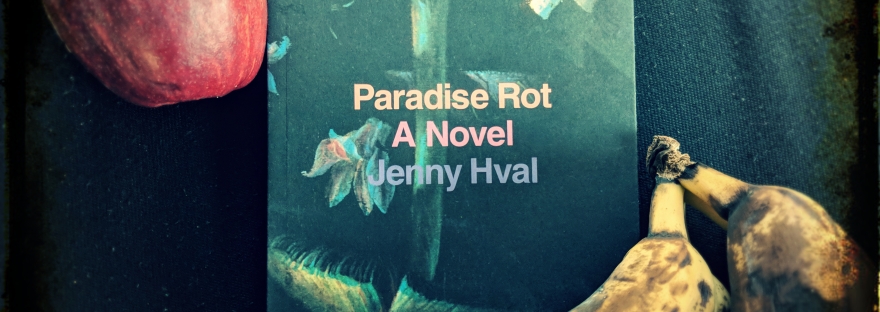I remember the first time I saw Janny Hval. She was performing at the Bella Union in Trades Hall and was supporting Laura Jean. She was on stage with a double bass, and a drum kit. There might have been other instruments, I don’t remember that. I do remember her voice: ethereal, and pure. Her voice was morning sunlight made song. She put me in mind of Milton’s Lapland witches, whose charms eclipsed the labouring moon. Ever since then, I’ve been chasing that first encounter. I found a version of it in her album Viscera, although less so in later albums and performances. I was hoping that her book, Paradise Rot, would again, trip up my experiences. It did.
Hval’s novel was first published in 2009, predating my beloved Viscera by two years,m however it has only just been translated (my Mariam Idriss) from Norwegian to English. It seems to be embedded in a similar aesthetic to Viscera, one from which Hval has moved on in her recent creative endeavours, which I have found more pared back and minimalist. Paradise Rot is told from the perspective of a young Norwegian exchange student, studying biology at a foreign university. The country in which she is studying is never identified, although it is Anglo-centric. I lean towards reading it as being set somewhere like Tasmania, how accurate that is, I don’t know. The language throughout is rich and poetic, sometimes overwhelming, however this works aesthetically, as the book details these states of abjection and decay that are filled with the sweet, damp putrefaction best captured by evocative and decadent language.
Hval explores the young student’s blooming sexuality, framing it through her fascination with spores, mould and mushrooms. The warehouse in which she and her would-be lover live becomes increasingly nebulous and permeable: the lack of physical walls in the building is adopted by the characters who seemingly forget the boundaries their own bodies create: skin is porous, bodily fluids are uncontrollable, subjectivity and lived experience are shared. It is uncertain whether this mo(u)lding is a shared delusion or otherworldly, and subsequently the reader themselves is uncertain, of what they have read, and of the embeddedness of other stories.
Hval references Genesis regularly, and the symbolic function of the apple as a metonym for women’s sexual knowledge and agency is subtly but consistently invoked. I cannot help but remember Kristeva as I read Paradise Rot: her exploration of the abject, of rupture, of poetry, and more recently of forgiveness. Bodies and identities meld, rather than controlling each other. Sovereignty becomes impossible, but mutual respect is essential. Hval’s book unabashedly sits with the glory and the mess of feminised desire.

